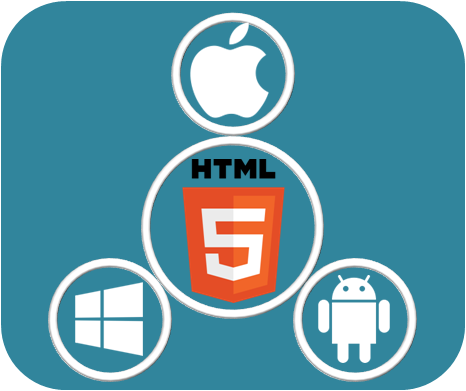In the starting phase, native code was the only option for developing apps. With the rise of frameworks like Phone Gap, Appgyver developers started using hybrid codes to writes their apps. These new apps based on frameworks with HTML5, CSS, Javascript are also known as Hybrid apps. After writing the code in these languages hybrid apps are compiled to get converted in the native code which actually runs on all mobile devices. Separate utilities or compilers or wrappers are available for converting the hybrid code into iOS or Android versions to suit all smartphones. PhoneGap and Cardova are two well known wrapper technologies currently in use.
App development companies are eager to get profit from app development and ask developers to speed up. Developers are forced to learn things fast and deploy their knowledge in business. App development framework helps developers in such conditions. Developers can write codes in already known languages such as HTML5, Javascript and can then convert it to native code. Additionally frameworks often provide API for camera, GPS to speed up the development process. Developers need to practice precautions while using frameworks as result might not be as expected. Here is a list of Do’s and Don’ts when using hybrid approach to develop mobile app.
Do’s
- Use Javascript Frameworks like AngularJS. It is not dependent on heavy library JQuery, it will surely reduce the overall app size. Another good choices are Backbone.js with helper libraries like App.js , Thorax.
- If your app requires lots of UI work, then you can go for Ionic UI library. It adds native like transitions to your app.
- Minifying your app code can enhance performance. Reduced file size fits for all mobile devices.
- Optimizing all graphics to suit the viewport gives you benefits of reduced size and great look. Tinypng can be of great help to reduce file size and maintain good quality.
- There is no option for rigorously testing your app on different devices. This activity shows the real performance of your app. For testing, you can take help from following tools – Browser-perf, New Relic’s mobile monitoring. These tools can show reports on issues like errors, load time, screen transitions.
- It is impossible to test your app on every model of mobile. You can use Canary emulator available on Chrome to emulate various devices to test your app’s performance.
- App speed is a crucial issue where hybrid apps may fail to perform. You can use local storage of the device to increase performance of your app.
- Try to use a framework with mix of hybrid as well as native components. You can leverage the power of native code and flexibility of writing code in HTML at the same time.
Don’ts –
- Avoid using heavy libraries such as JQuery. It is works best for web application but for mobile apps, it creates unnecessary storage burdon.
- Adding too much functionality can bog down the performance of your hybrid app. If you need function-rich app, then go for native code.
- Don’t try to load everything at once in the view. Loading graphics and text in separate and sequential data call can keep user engage.
- Avoid using hybrid approach for developing interactive games or graphics rich apps.
- Don’t expect your hybrid app code to work best on iOS and Android just after compilation. You need to do lots of adjustments for perfect view and performance for both the platforms.
Writing your app in native code is the best practice however hybrid is not that bad. If you already know HTML5, and Javascript you can catch fast on Mobile App Development using hybrid frameworks.
Contact us for if you are looking for Html 5 Development Specialist and we will help you acquire the best possible solutions to your requirements at https://www.heliossolutions.co/front-end-technologies/




